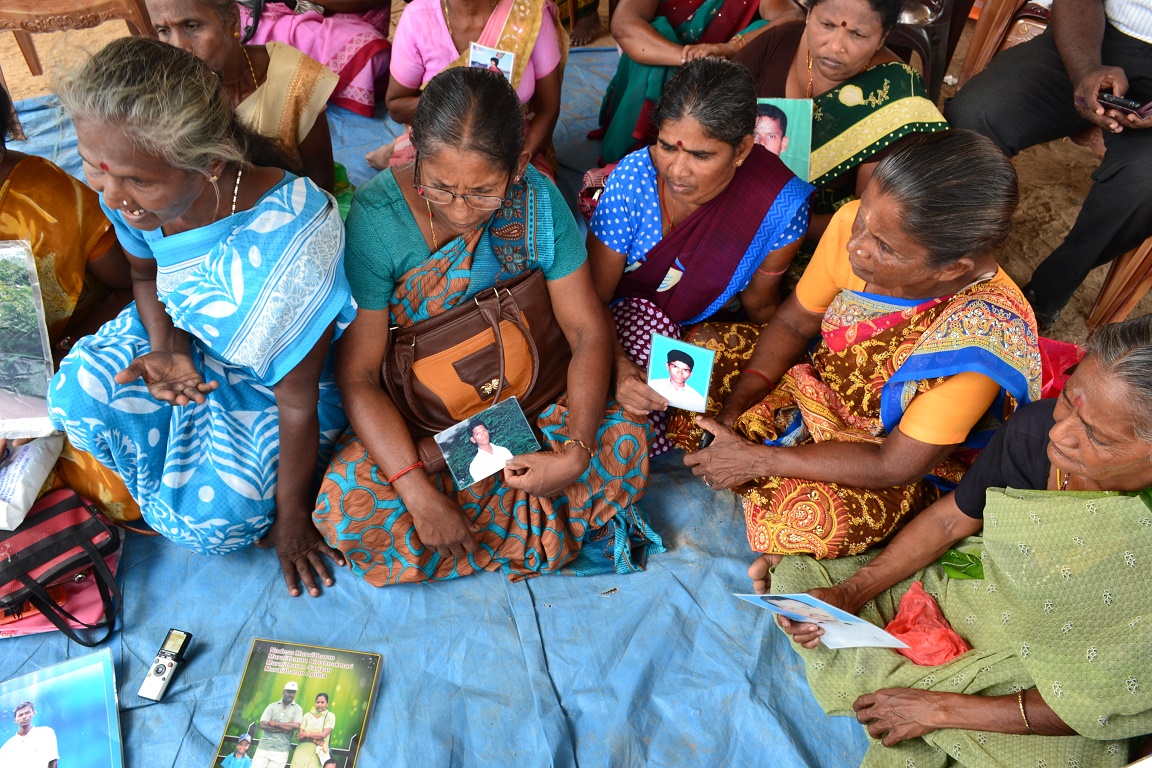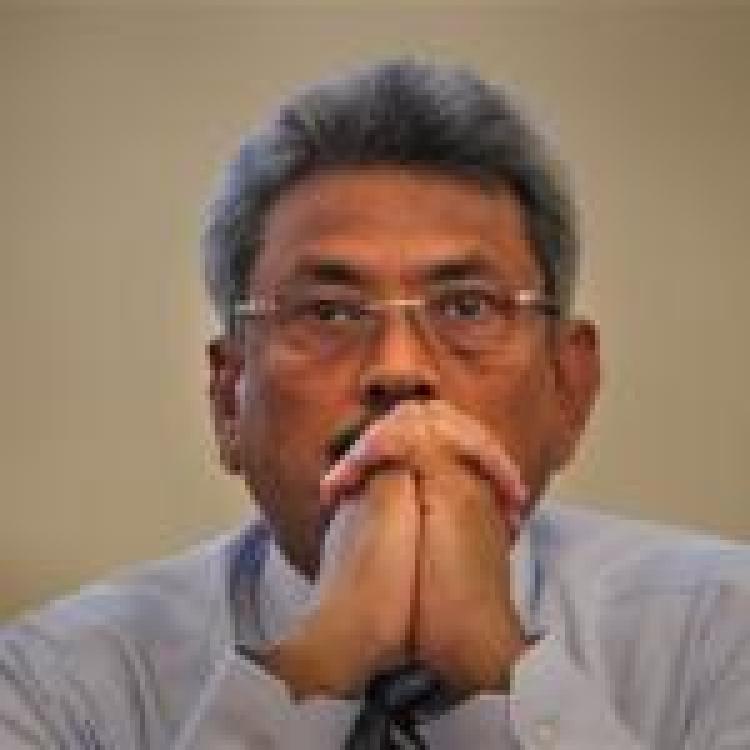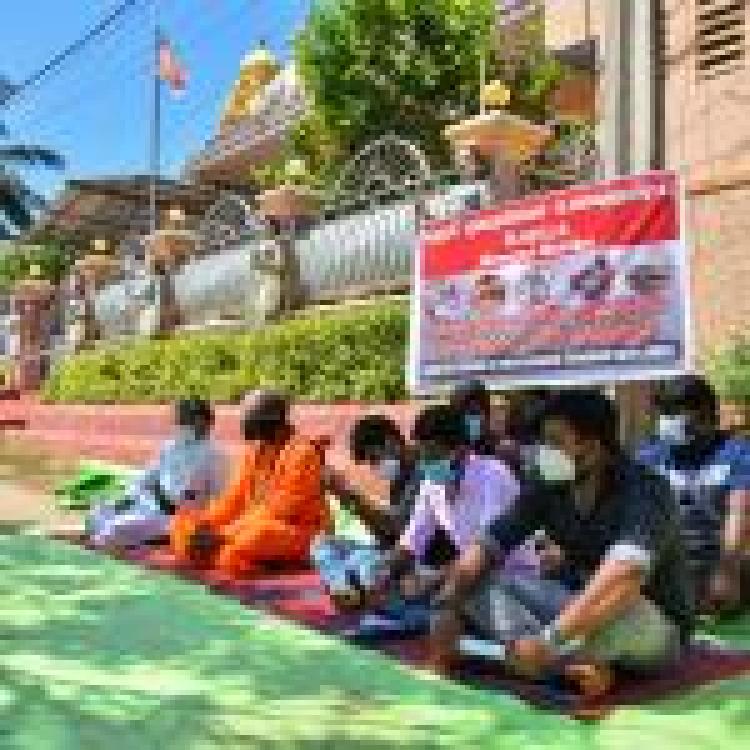 (Photo of Families of the Disappeared in 2017 in Kilinochchi)
(Photo of Families of the Disappeared in 2017 in Kilinochchi)
Writing in Just Security, Dharsha Jegatheeswaran, Co-Director of the Adayaalam Centre for Policy Research, a human rights think-tank based in Jaffna, illustrates how the “Tamil families of the disappeared have shown, there is no hope for truth and justice domestically in Sri Lanka”.
“The only way to provide these families their long-overdue answers and justice to all victims in Sri Lanka is to break the seal around the military through international accountability”, she maintains.
Jegatheeswaran’s piece reflects on her work with the Families of the Disappeared who have spent over four years protesting, demanding an account for their loved ones who were forcefully disappeared during the conflict. Approximately 100,000 people were forcefully disappeared during the conflict, with the vast majority being Tamils during the last phase of the war.
In her piece, she notes her experience of attending workshops in November 2017 arranged by European embassies which sought to bring together different victim communities and focused on “transitional justice”. Experts engaged in the workshops would advocate that Families of the Disappeared, who were protesting, should engage with government’s new Office of Missing Persons (OMP). They derided opposition from these Tamil families who had no trust in the OMP, suggesting that they were “being influenced by politicians”.
Jegatheeswaran notes:
“The experts clearly failed to grasp the depth of knowledge and understanding among the families about the myriad obstacles that block their quest for truth and justice in Sri Lanka. The exchange reflected a familiar scenario in transitional justice discussions: when victims speak not only about their own personal victimization but also about systemic issues, they are viewed as “politicized” and their concerns are diminished”.
She further states that “Tamil families of the disappeared saw in 2017 what would take two more years for transitional justice experts to understand: that the ‘National Unity Government’ had no intention of following through on its international commitments to accountability and truth”. They knew this because “they had already searched for years for their loved ones […] and had sincerely tried to engage with the government that had been newly elected in 2015”.
By this time, “families knew that, without international pressure and action, truth and justice would remain elusive”.
Misplaced faith
In 2016, Jegatheeswaran notes, how Families of the Disappeared, despite having endured “years of failed commissions” and “broken government promises”, engaged with the newly established Consultation Task Force (CTF). The CTF had been promoted as an independent civil society-led body that would consult with communities across Sri Lanka on transitional justice initiatives,
The leaders of the associations, that chose to engage with the CTF, had spent years organising search parties to go from one military camp or police station to another, seeking information about their disappeared family members. This was vital so as to protect them from the risks involved as soldiers who would try to segregate individuals.
Jegatheeswaran highlights how many of these women risked not only their physical safety but also their “reputations in their communities to participate in the CTF’s consultations”. They did so under the belief that the “government would support their search for answers and the possible return of their loved ones”.
However, in August 2016, parliament passed the Office of Missing Persons bill, the government failed to even consider an interim report on the OMP that the CTF had rushed to complete. In December 2016, when the CTF finalised its report, then President Maithripala Sirisena refused to meet with the task force to accept it.
The report was instead handed to former President Chandrika Kumaratunga, who at the time was the head of the Office of National Unity and Reconciliation. Key demands of the report included the endorsement of a “hybrid court and ensuring there were clear links between the different transitional justice mechanisms so that they would work in coordination”. These families were rightfully concerned that the “OMP could turn into another truth commission that amounted to nothing if it wasn’t clearly linked to a justice mechanism”.
However, this was met with harsh criticism from senior government officials which claimed that the CTF had overstepped their bounds by speaking of accountability. In response to the governments disregard of their concerns, Families of the Disappeared, inspired by “Las Abuelas de Plaza de Mayo” in Argentina, launched protests in Kilinochchi. These protests rapidly spread to all eight districts of the North-East. These protests persisted for 100 days before relenting after having secured a meeting with President Sirisena.
Silencing the Families
During this meeting, the Families of the Disappeared put forwards the following demands:
- All those who surrendered to or were detained by the Sri Lankan Armed Forces during and after the war, particularly during the last stages
- All secret detention centres run by the Sri Lankan Armed Forces and Police throughout and after the war;
- All detainees held under the Prevention of Terrorism Act (PTA) from 1983 onwards.
Whilst Sirisena had reportedly made this request to the military, the military refused to comply. Jegatheeswaran highlights that “there was no real mechanism to hold them accountable for complying with the request or incentivize their cooperation”.
This was all the more evident on 16 November 2017, when Sirisena met with the Families of the Disappeared again “only to callously reject their demands and storm out of the meeting”.
“The appeal for international action made the families targets of criticism from the government in Colombo and even from certain segments of civil society as being ‘politicised’ and ‘disruptive’”, Jegatheeswaran notes.
Civil society organisations would proceed to engage with Families of the Disappeared who were more open to engaging with the OMP and who were not so “loud”. This was because, Jegatheeswaran highlights, “the protesting Tamil families of the disappeared were no longer “good victims” who could fit within convenient transitional justice paradigms”.
Instead, “They became an indomitable force in Tamil politics, rightfully speaking on the politics of justice and accountability based on their direct experience. The mothers and wives of the disappeared leading these associations grew adept at utilizing their “victimhood” as a source of agency and power, steeling themselves against attempts to speak for them or monopolize their struggle”.
This, she notes, occurred despite the increase in surveillance and harassment by Sri Lankan security forces in 2018. It would continue to persist during Rajapaksa’s presidency, when, under the guise of COVID-19 prevention, “police have sought orders against many of these women to block their protests”.
Jegatheeswaran writes that these “women are now receiving multiple calls a day from intelligence officers, and even dealing with visits to their homes. Several have been called in for interrogation by the infamous Terrorism Investigation Department, notorious for torture”.
“The Sri Lankan government has gone from dismissing their cries for justice, to actively seeking to silence them”, she adds.
International action
The piece concludes noting that last month Families of the Disappeared, alongside Tamil political parties and civil society organisations put forwards a joint statement calling for “Sri Lanka to be referred to the International Criminal Court; for increased monitoring by the Office of the High Commissioner for Human Rights, including through a field presence; and for the establishment of an international evidence-gathering mechanism”.
It has become clear that the “only way to provide these families their long-overdue answers and justice to all victims in Sri Lanka is to break the seal around the military through international accountability”.




